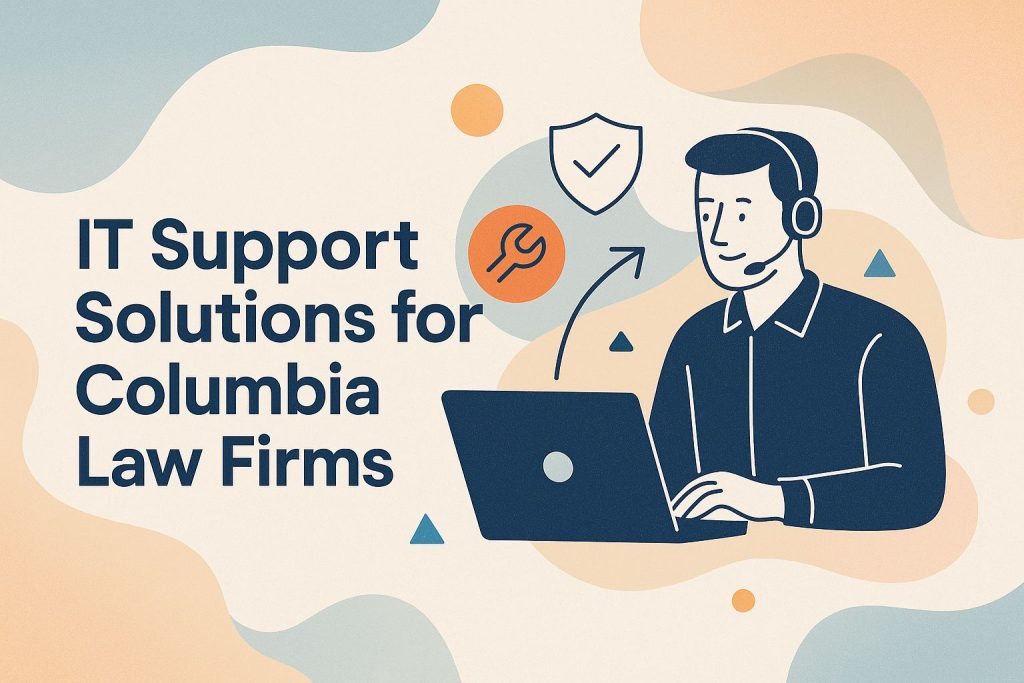IT Compliance for Columbia SC Law Firms: Meeting State and Federal Requirements

Ensuring IT compliance for Columbia SC law firms is critical for protecting sensitive client data, maintaining regulatory standards, and building trust. Law firms must navigate complex state and federal regulations, including HIPAA, GDPR, and local privacy laws, to safeguard information effectively.
This article outlines key compliance components, practical strategies for law firms, and how to meet evolving IT security and privacy standards.
Explore our Cybersecurity Services to enhance your law firm’s compliance posture.
Understanding IT Compliance for Columbia SC Law Firms
IT compliance refers to adhering to legal standards that govern data security, client confidentiality, and privacy. These regulations ensure that law firms handle sensitive client information responsibly.
With legal technology advancing rapidly, maintaining compliance has grown more complex. Firms must stay ahead of compliance audits, cybersecurity threats, and changing privacy laws to protect client trust accounts and uphold ethical standards.
For regulatory frameworks, visit HIPAA Privacy Rule Overview and GDPR Compliance Guidelines.
Key Components of IT Compliance for Columbia SC Law Firms
Meeting IT compliance requirements involves several key components:
- Data security and privacy measures.
- Backup and disaster recovery plans.
- Employee training and access control.
These elements help law firms maintain cybersecurity, client confidentiality, and adherence to regulations.
Data Security and Privacy Measures
Law firms must implement data protection policies that include:
- Encryption for data storage and transmission.
- Incident response plans.
- Regular risk assessments.
These safeguards protect against cyber threats and ensure compliance with privacy laws.
Refer to NIST Cybersecurity Framework for security standards.
Backup and Disaster Recovery Plans
A robust backup and disaster recovery plan ensures business continuity and compliance. Law firms should:
- Schedule regular data backups.
- Conduct risk assessments to identify vulnerabilities.
- Implement incident response protocols to minimize breach impacts.
These measures reduce legal and operational risks, supporting client trust and regulatory adherence.
Employee Training and Access Control
Employee training and access control are vital for compliance. Best practices include:
- Conducting regular training on cybersecurity threats and privacy laws.
- Implementing role-based access control (RBAC) to limit data access.
- Encouraging a culture of compliance within the firm.
Meeting IT Compliance Requirements for Columbia SC Law Firms
Achieving compliance involves:
- Compliance monitoring.
- Regular audits.
- Integration of compliance software.
These practices streamline compliance efforts and minimize legal risks.
Explore our IT Strategy and Planning Services to support your firm’s compliance framework.
Steps to Achieve Compliance
Follow these steps to ensure compliance:
- Conduct compliance checklists and risk assessments.
- Establish security policies aligned with industry standards.
- Implement continuous training and monitoring.
- Perform regular audits to identify gaps and update processes.
For additional small business compliance tips, visit SBA Cybersecurity Tips.
Common Challenges and Solutions
Law firms often face:
- Complex legal regulations.
- Cybersecurity threats.
- Consistent policy enforcement.
Solutions include:
- Tailored compliance strategies.
- Employee training.
- IT consulting partnerships.
These approaches help mitigate risks, safeguard client data, and maintain compliance.
Frequently Asked Questions
What is IT compliance for Columbia SC law firms?
It involves ensuring IT systems follow legal standards for data security and privacy.
Why is IT compliance important for Columbia SC law firms?
Compliance helps law firms avoid fines, protect client data, and maintain trust.
What are the key regulations affecting IT compliance?
HIPAA, GDPR, and state privacy laws.
How can law firms achieve IT compliance?
Through risk assessments, data security measures, employee training, and regular audits.
What are the risks of non-compliance?
Fines, legal penalties, reputational damage, and loss of client trust.
How can IT compliance services help?
They provide risk assessments, compliance planning, staff training, and ongoing support.
Contact our IT compliance experts to strengthen your law firm’s compliance framework.




